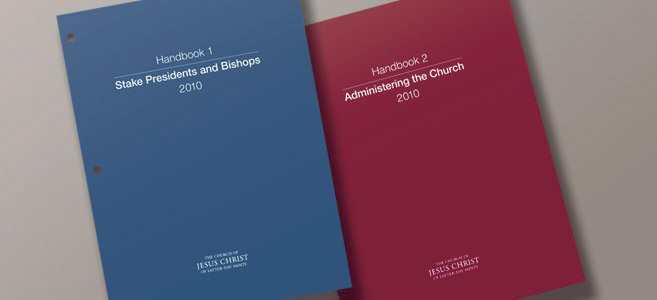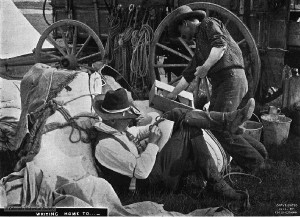What, exactly, is The Handbook? Is it scripture? Is it not scripture? Is it revelation? Is it not revelation? How can we say we believe in teaching correct principles and letting individuals govern themselves if we have a 400+ page handbook? I’m sure our handbook is longer (my several multiples) than any set of rules the Pharisees had, so what would Christ think of our handbook? What would Joseph Smith think of it? Why does the church think it needs to dictate whether or not male members should get vasectomies (just one item included in the handbook)?
Best,
Luther
;
Dear Luther,
Although I imagine there are those who would disagree with me, I would say the Handbook is not scripture. In my mind it’s more akin to the illustrated instructions you’ll find above the counter of a McDonald’s kitchen that give employees the exact order for the buns, lettuce, patty, ketchup, mustard and onions. The Handbook may reflect the values of the organization, but it’s largely about quality control and brand maintenance for the LDS franchises that have sprung up around the world to serve their millions (exactly how many millions nobody knows, it depends on who is doing the counting and how they are doing it).
Whether that sounds hugely cynical or like sensible business practice depends a lot on how you view the organization of the church. I’m not a big fan of handbooks and correlation because they seem to put too much focus on the people working for the church rather than the church working for the people, but I understand the pragmatic impulse behind making some standards and trying to get things organized. As much as a lay clergy gets people uniquely invested in building the kingdom, our unpaid, largely untrained volunteer service leaves a lot to chance. And our leaders are not wrong in thinking that individuals may need some guidance in the huge responsibilities they take on in addition to their own careers and busy lives. I imagine the Handbook is designed to keep individual leaders away from their greatest excesses, to soften the harshest judge and reign in the most liberal interpretations of doctrine and behavior.
So what would Joseph Smith think of our 400+ page book? Who knows? The church without a handbook might look a lot like the church Joseph Smith knew — a church full of idealistic dreamers and fiery bible-thumping Protestants experimenting with unorthodox living arrangements like polygamy and socialism. Joseph Smith was reported to have said, “I teach correct principles, and they govern themselves.” Christ’s harshest judgments were towards the rule-happy Pharisees. Joseph Smith and Christ taught and are symbols of big ideas, which is why it can feel incongruent that a church inspired by big ideas now has its day to day operations run by a list of rules that wouldn’t seem out of place in any other big corporation (for some historical insight on how this came about, I would highly recommend this Mormon Stories interview).
However, I would also say that human nature has played a huge role in the evolution from big ideas to lots of small rules. Human beings come to religion to seek God, but they also come to religion to seek structure, to give their experiences in this life form and meaning. There will always be some — my fellow Jack Mormons — who bristle at rules, at the way they don’t seem to take the reality and complexity of people’s lives into account, but many people find rules comforting and find relief in the idea that there is some authority outside their own messy lives that can tell them exactly what to do in any given situation. And that’s not a bad impulse either. There are plenty of people who know more about all kinds of things than I do and there is wisdom in seeking their counsel. But handbooks, like McDonald’s, are not designed to take into account people’s individual needs or desires. To use the example raised in the question, there are many legitimate reasons for a man to get a vasectomy — he already has as many children as he can emotionally or temporally afford, he is faithful to his partner and has no plans to spread any more of his seed, or his wife cannot tolerate birth control etc. The handbook itself only acknowledges medical reasons and “strongly discourages” vasectomies as a form of “elective birth control.” But I would argue that the spirit behind any of the reasons I listed above is reasonable and moral.
We can choose — or not — to let the Handbook give us guidance, but, as Joseph Smith said we ultimately have to govern ourselves. We ultimately have to live with the consequences or our decisions and we must decide if the Handbook is an authority we want to trust.
Yours,
Jack
Have a question for Jack? Submit it HERE.
;


“In my mind it’s more akin to the illustrated instructions you’ll find above the counter of a McDonald’s kitchen that give employees the exact order for the buns, lettuce, patty, ketchup, mustard and onions. The Handbook may reflect the values of the organization, but it’s largely about quality control and brand maintenance for the LDS franchises that have sprung up around the world to serve their millions (exactly how many millions nobody knows, it depends on who is doing the counting and how they are doing it).”
This is great. And, some members keep saying “Super Size Me!”
“Any member of the church of Christ transgressing, or being overtaken in a fault, shall be dealt with as the scriptures direct.” (D&C 20:80). No mention of a handbook.
Intelligent, inspired leaders will view the handbook as a source of wisdom and guidelines, but NOT as a law or scripture unto itself.
A couple months ago we got approval to have a small christmas party in an LDS building, in the gymnasium area. We set up a 5 foot fake christmas tree that had lights built into it. Some facilities dude happened to come by and saw the tree, and proceeded to CHEW OUT my wife for plugging in a Christmas tree “because the handbook says you can’t do that.”
Lucky for him, I wasn’t there. My wife handled it diplomatically by simply unplugging the tree (then plugging it back in after he left).
Having said all that, in the course of 180 years of administration, certain tactical lessons are worth sharing globally. Given the nature of lay-leadership, such a manual is a necessity. As for vasectomies…well yes the handbook probably gets a little too involved! hahaha
The handbook is useful as a resource when used properly. The church leadership does not tell local leaders that it is a resource and not scripture. They should clearly state how to use it.
It comes down how the local leaders perform their duties. There is a lack of good leadership in leadership positions. That is the real issue. There is no common sense of what I see. It has been a long process of less and less practical leaders being called. This is more of an issue than the handbook being used as scripture.
Foolish people in leadership positions call more foolish people to other leadership positions. True compassionate leaders that can relate to members and people outside of the church is what is required.
Super article, Was so bored, this article made my night! LOL at some of ya guys!Stretch Mark Removal